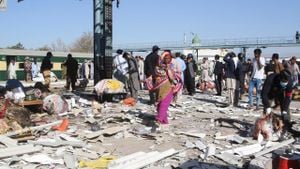Escalation in the Ukraine conflict is ringing alarms worldwide, with leaders across the globe issuing dire warnings of the potential for World War III. Central to this concern is the militarization efforts by both Russia and Ukraine, exacerbated by international support dynamics and geopolitical maneuvering among major powers.
On one hand, Ukrainian Ambassador to the UK, Valeriy Zaluzhny, articulated the chilling notion during a recent address, stating unequivocally, "World War Three has already begun." This proclamation underlines both the urgency and the gravity of the current military engagements, as Zaluzhny noted not just Russian forces but the involvement of soldiers from North Korea and Iran, complicatively widening the conflict’s scope.
Zaluzhny, recognized for leading Ukrainian defenses during the early tumult of the invasion, highlighted the diverse array of adversaries now confronting Ukraine on the battlefield. He claimed, "I believe we can absolutely definitely say the Third World War has begun," showcasing the ambassador’s resolve amid worsening conditions.
Indeed, the Ukrainian military has been bolstered by Western support, namely the provision of advanced missile systems from the U.S. and UK. Reports indicate these systems have enabled Ukraine to penetrate deep within Russian territory, prompting Russian President Vladimir Putin to respond with threats of nuclear escalation. Putin has asserted his country’s readiness to employ newly developed missile technology, labeled the Oreshnik, which can allegedly bypass conventional air defense systems. The ominous warning from the Kremlin signifies Russian desperation to restore deterrence as Western support enhances Ukraine’s military capabilities.
According to experts analyzing the Russian military’s current situation, the hypersonic missile employed recently is part of Putin’s strategy to deter Western interests and signal power amid what he perceives as provocations. Matthew Savill, director of military sciences at the Royal United Services Institute, pointed out the missile’s unprecedented speed and payload capacity, but directed skepticism over its practical application, arguing it serves primarily as performative warfare.
Compounding these tensions, China has stepped forward, urging restraint from both Russia and Ukraine. Chinese Foreign Ministry spokesperson Lin Jian emphasized the importance of dialogue and restraint to de-escalate the situation, hinting at China’s aspiration to mediate, positioning itself amid the rising global tensions.
Meanwhile, Zaluzhny’s command of military strategy remains pivotal for Ukraine. He has called upon the West to reconsider its strategies to support Ukraine, arguing, "Everything can still be stopped here, on the territory of Ukraine," thereby emphasizing the significance of decisive action from Western allies to prevent futher escalation.
The conflict has also drawn sharper lines with the prospect of Donald Trump returning to the White House as he prepares for the upcoming elections. Zaluzhny expressed optimism over potential shifts during Trump’s presidency, which might influence how the U.S. interacts with both Ukraine and Russia moving forward.
Putin’s recent missile launches serve as tangible evidence of the intense back-and-forth exchanges between the two nations. Describing the missile’s capabilities, Putin noted this intermediate-range missile could strike key allies of Ukraine swiftly. The implication here is clear; the stakes are rising, and the chance for miscalculation is greater than ever.
An important observation is the growing global unease surrounding Russia’s military dominance. Even as Russia announces new missile capabilities, the sustaining presence of international backers for Ukraine contributes to heightened fears of conflict spiraling out of control.
Military analysts are divided on whether the current hostilities will lead to full-scale war involving NATO powers. The term 'proxy war' has been bandied about, highlighting the struggle each side faces—with Ukraine relying on Western military support, and Russia echoing its reliance on strategic alliances with states like North Korea and Iran.
To what extent the West remains committed to supporting Ukraine against these formidable adversaries can greatly affect the conflict’s future outcomes. The fluctuative political landscapes within the U.S. and Europe may dictate whether assistance continues at current levels or expands. For now, the conflict remains at the forefront of international discourse, with the looming specter of World War III influencing decisions made at the highest levels.
Crucially, military experts have stressed the feasibility of using sophisticated missile systems could significantly alter engagement rules on both sides, leading to unforeseen consequences if mismanaged. Zaluzhny’s call for international focus remains poignant: maintaining dialogue could still provide pathways toward peace even amid growing tensions.
Global tensions continue to evolve, underlining the urgent need for diplomatic solutions alongside strategic military planning to navigate this high-stakes situation. With each missile launched and each threat made, the international community holds its breath, hopeful for de-escalation rather than escalation toward global conflict.
What the future holds is uncertain, but as Zaluzhny alluded, decisive action and global collaboration can make the difference. The world watches closely, and the collective hope rests on the notion of peace prevailing above the chaos of war.



